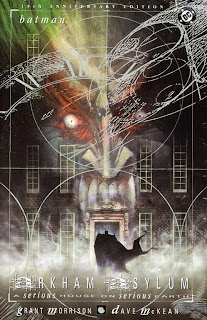1. I am full of fever, which has impacted my vision and thinking in subtle yet profound ways. This means I can't type for shit right now and my always-convoluted thought-processes have become extra-twisty. So apologies for any spelling/grammar/punctuation errors and further apologies if style is somewhat lacking (I don't have Word on this laptop, so can't cheat my way with Spell-Check).
2. This is a straight-up geek-fest of a post. If you're not into that, I'd go read something else if I were you. If, however, you have any right and natural appreciation for Batman and are willing to forgive/overlook the problems listed in point 1, then please, pull up a pew and continue on...
Boyfriend and I have recently spent quite a bit of time discussing Batman* and we've been mulling over the problem of Batman's treatment of criminals: namely, that he throws them (sometimes literally) into Arkham Asylum. On the surface this is the only thing Batman can do: Batman, afterall, does not kill**, so how else can the criminals and super-villians he defeats be brought to justice and kept off the streets? Ordinary jail is obviously unsuitable and Gotham's police are pretty useless, after all.
Take more than a second to think about it, however, and it all starts to fall apart. Arkham is, very obviously, designed more for (ineffectual) containment and punishment, rather than rehabilitation. Probably a hangover from the 1930s origin of Batman, Arkham is more Victorian nightmare-factory than modern centre for the treatment of those with psychiatric disturbances.
This is how a moden mental health facility looks:

Aaaand this is just one version of Arkham:

Can you spot the difference? It's subtle, I know, but if you pay close attention to the landscaping you'll notice that the modern facility favours light wood panelling and shrubbery, whilst Arkham is more screaming insanity-fest.
Nothing about Arkham suggests treatment: super-villians who end up there don't get better, don't undergo years of medical and psychanalytical treatment that will one day enable them to re-enter Gotham society as productive and valued citizens. In fact, far from the super-villians getting well, it's the doctors who get sick.
Take Harley Quinn:
 Harley was, originally, Doctor Harleen Fances Quinzel and started life in the D.C. Universe as a psychiatrist. She attempted to treat the Joker, ended up falling for him, became obsessed with him, and the rest is comicland history. Arkham is such an ineffectual centre for the treatment of the criminally insane that, instead of the criminally insane becoming, well, sane, the doctors
Harley was, originally, Doctor Harleen Fances Quinzel and started life in the D.C. Universe as a psychiatrist. She attempted to treat the Joker, ended up falling for him, became obsessed with him, and the rest is comicland history. Arkham is such an ineffectual centre for the treatment of the criminally insane that, instead of the criminally insane becoming, well, sane, the doctors
become insane.
Aside from that issue (and the much more complex consideration about just how you define "sane" and "insane" and who gets to differentiate between the two) there's the fact I hinted at earlier: Arkham just isn't very good at keeping its inmates in. I was going to list here all the inamtes who have escaped; but as surmrised by Chris Sims, the internet's foremost Batmanoligist: "Everyone. Everyone has escaped."
Clearly, Arkham's primary function is captivity not recuperation, and it doesn't do a very good job of either.
So why, you may ask, does Batman keep putting villains in there? And I'm glad you would ask that, because much like Giles, I've got a theory.
Batman doesn't want his enemies to get better. Oh sure, if you asked him outright he'd probably say that he's working towards a safer Gotham, but if that was really what he wanted then, as Bruce Wayne, he could just invest millions of dollars into improving Gotham's police force and working with Commissioner Gordon and some hand-picked politicians to try and tackle Gotham's endemic corruption problems. If all that failed, then Wayne could simply invest money into building a better Arkham. Either one that actually treated its patients, or one with much thicker walls. And tighter security.
Instead, Batman/Wayne needs his enemies: without supervillains, after all, he cannot really be a superhero. If there were no more criminals to tackle that Gotham's police force couldn't handle, then Batman would have to give up the night-job and stick to his day-job.
True, his day-job is being a playboy billionaire, but still. It's clearly an unfulfilling role for Wayne, hence his persistant need to be Batman.
 If he wanted to make Gotham a safer place, then Batman/Wayne should be helping build mental health facilities that actually help those with mental health problems; supporting and developing Gotham's police and government into reliable, trustworthy and efficient forces (within reason); and then probably seeking out some mental health treatment of his own, to deal with his ongoing vengeance/abandonment issues following the murder of his parents.
If he wanted to make Gotham a safer place, then Batman/Wayne should be helping build mental health facilities that actually help those with mental health problems; supporting and developing Gotham's police and government into reliable, trustworthy and efficient forces (within reason); and then probably seeking out some mental health treatment of his own, to deal with his ongoing vengeance/abandonment issues following the murder of his parents. Instead Batman locks the super-villains away for a little while, so he can take on someone new (and get in some all-important playboy billionaire action) before facing up to defeat his original foes all over again. He needs the cycle of violence and retribution to continue in order to continue being Batman; and Batman has become his primary identity. His defeat of his enemies is a validation of himself; he is good because they are bad. Without this dichotomy, the "Bruce Wayne" identity just isn't enough for him.
...Or the writers just need some easy way around the whole "Batman doesn't kill/fans want favourite villains back" issue. Whatever you prefer.
*Yes, I have considered the possibility that our mutual love of Batman is a building-block in our love for each other.
** If I have to explain Batman's moral code to you, then you probably shouldn't be reading this post. But just in case (or just because) you should probably read this, because Chris Sims knows a